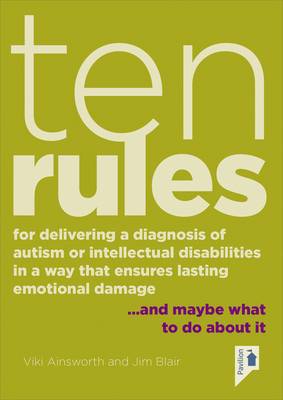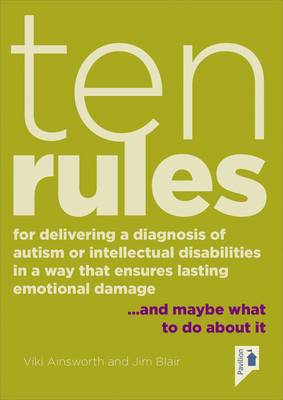
- Afhalen na 1 uur in een winkel met voorraad
- Gratis thuislevering in België vanaf € 30
- Ruim aanbod met 7 miljoen producten
- Afhalen na 1 uur in een winkel met voorraad
- Gratis thuislevering in België vanaf € 30
- Ruim aanbod met 7 miljoen producten
Zoeken
Ten Rules for Delivering a Diagnosis of Autism or Learning Disabilities in a Way That Ensures Lasting Emotional Damage
...and Maybe What to Do about It.
Viki Ainsworth, Jim Blair
€ 11,95
+ 23 punten
Omschrijving
Diagnosis of learning disabilities or autism can happen at any point in an individual's life. While this should mean freedom to move forward with information to access all that's needed to live a fulfilling and rewarding life, the huge obstacles that exist in reality can make a diagnosis a cause for dismay. Furthermore, the way in which the diagnosis is delivered is often done without thought or preparation and consequently ensures lasting emotional trauma to the individuals involved and their loved ones. The aim of this thought-provoking booklet is to directly challenge the method and moment a diagnosis is given, so that it can become the defining opportunity to set individuals and their families off on a positive, hopeful path rather than a negative, diminished one. Each 'rule' speaks powerfully with the voice of the individual or family on the receiving end of diagnosis. Together, the 10 rules provide a useful starting point for discussion and a catalyst for action. Each is followed by suggestions for positive practices. The booklet also contains additional background information on good practice, together with references and sources of further information. The booklet has been written for anyone involved in providing diagnoses and follow-up support to autistic people, those with learning disabilities and their families, together with allied professionals, carers and student in relevant disciplines. It can be used for a wide range of purposes, including staff induction, learning disability and autism awareness training, individual professional development and reflection, and team discussions about the quality of practice and services provided.
Specificaties
Betrokkenen
- Auteur(s):
- Uitgeverij:
Inhoud
- Aantal bladzijden:
- 75
- Taal:
- Engels
- Reeks:
Eigenschappen
- Productcode (EAN):
- 9781911028925
- Verschijningsdatum:
- 1/04/2018
- Uitvoering:
- Paperback
- Formaat:
- Trade paperback (VS)
- Afmetingen:
- 114 mm x 203 mm
- Gewicht:
- 54 g

Alleen bij Standaard Boekhandel
+ 23 punten op je klantenkaart van Standaard Boekhandel
Beoordelingen
We publiceren alleen reviews die voldoen aan de voorwaarden voor reviews. Bekijk onze voorwaarden voor reviews.











